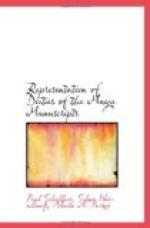E-text prepared by Julia Miller and the Project Gutenberg Online Distributed Proofreading Team (http://www.pgdp.net/)
Note: Project Gutenberg also has an HTML version
of this
file which includes
the original illustrations.
See 18013-h.htm
or 18013-h.zip:
(http://www.gutenberg.ne
t/dirs/1/8/0/1/18013/18013-h/18013-h.htm)
or
(http://www.gutenberg.ne
t/dirs/1/8/0/1/18013/18013-h.zip)
Transcriber’s Note:
A number of typographical
errors have been maintained in
this version of
this book. A complete list is found at
the end of the
text.
Papers of the Peabody Museum of American Archaeology
and Ethnology,
Harvard University
Vol. IV.—No. 1
REPRESENTATION OF DEITIES OF THE MAYA MANUSCRIPTS
by
DR. PAUL SCHELLHAS
Second Edition, Revised
With 1 Plate of Figures and 65 Text Illustrations
Translated by Miss Selma Wesselhoeft and Miss A. M. Parker
Translation revised by the Author
Cambridge, Mass.
Published by the Museum
December, 1904.
NOTE.
In order to make more widely known and more easily accessible to American students the results of important researches on the Maya hieroglyphs, printed in the German language, the Peabody Museum Committee on Central American Research proposes to publish translations of certain papers which are not too lengthy or too extensively illustrated. The present paper by one of the most distinguished scholars in this field is the first of the series.
F.
W. Putnam.
Harvard University
September, 1904.
PREFACE.
Since the first edition of this pamphlet appeared in the year 1897, investigation in this department of science has made such marked progress, notwithstanding the slight amount of material, that a revision has now become desirable. It can be readily understood, that a new science, an investigation on virgin soil, such as the Maya study is, makes more rapid progress and develops more quickly than one pertaining to some old, much explored territory.
In addition to numerous separate treatises, special mention should be made of Ernst Foerstemann’s commentaries on the three Maya manuscripts (Kommentar zur Mayahandschrift der Koeniglichen oeffentlichen Bibliothek zu Dresden, Dresden 1901, Kommentar zur Madrider Mayahandschrift, Danzig 1902, and Kommentar zur Pariser Mayahandschrift, Danzig 1903) which constitute a summary of the entire results of investigation in this field up to the present time.
The proposal made in the first edition of this pamphlet, that the Maya deities be designated by letters of the alphabet, has been very generally adopted by Americanists, especially by those in the United States of America. This circumstance, in particular, has seemed to make it desirable to prepare for publication a new edition, improved to accord with the present state of the science.




